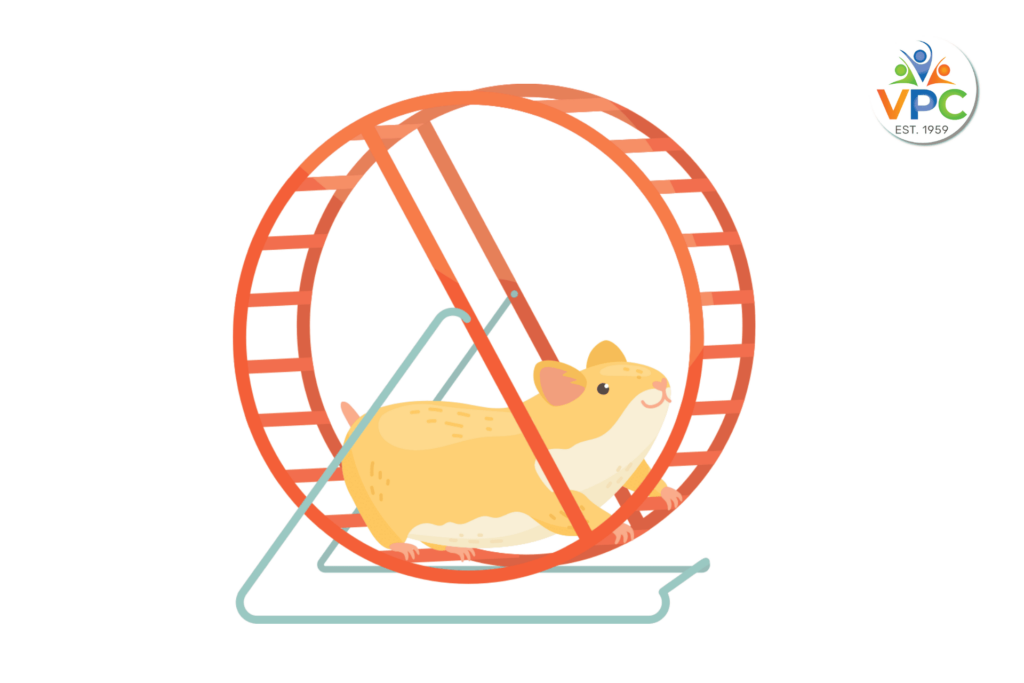
Are You Stuck on a Hamster Wheel?
Learn how to stop this unhelpful pattern of behaviour. There are better ways to communicate.
The hamster wheel
A conversation with your teen can sometimes feel like you are running on a hamster wheel. You feel like you are going around in circles, getting nowhere. As your stress levels increase, so does the intensity of the conversation. Ultimately, the wheel is spinning so fast that you are no longer in control. The problem is that your teen is on the wheel with you and will be as out of control as you are.
How do you know you are on a hamster wheel?
There are many different types of hamster wheel conversations. The easiest way to identify the most unhelpful are the ones you can think of that always end badly.
For example:
You have had one of those days where nothing has gone right. It is 7 p.m. and dinner isn’t close to being made.
Teen: I’m hungry!
Parent: Well, don’t look at me!
Teen: (Walks to the pantry and accidentally knocks the jar of honey onto the floor and honey goes everywhere.)
Parent: You can clean that up.
Teen: I’m not doing it. (Walks away.)
Parent: You get back here now and clean up this mess! (Brimming with anger.)
Teen: Go to hell!
Parent: That’s it. Give me your phone!
Teen: Go to hell! I hate you!
The scenario could potentially escalate further.
What can you do?
For yourself
Always start with yourself, because this is the only person you can control. Remember:
- Don’t get caught up: Whatever your teen said was done in a moment when they did not have their calm thinking brain in place. Possibly, neither did you. Try not to get caught up in the content of the words, and remind yourself that they have an immature nervous system that needs help learning how to stay calm.
- Try to be calm. How stressed are you? Do you know why? Take a moment and see if you can give your stress levels a rating out of 10. On this scale, zero is nothing, and 10 is a blind rage. Conversations best occur in the 3–6 range. After that, you will be too stressed to hear what your teen needs. Less than 3 and you probably feel too exhausted.
- Think about timing. Timing is everything. If there is something your teen needs to hear for their best interests, not yours, you should pick a moment when they are not stressed, anxious, angry, or shut down. Or as good as they get. This means you need to learn about their stress levels.
- Circle back: If the conversation ended badly, then you have the choice to circle back later. A circle-back conversation happens when both of you are calm.
For example:
You knock on your teen’s bedroom door and ask if you can come in for a moment.
Parent: I just wanted to say that I didn’t like the way our last conversation ended. I don’t want us to fight like that. I realise you were hungry, but I also had a bad day and was feeling stressed and tired. Next time, I will try to explain rather than snap at you.
Teen: That’s ok.
For your teen
Your teen’s brain and nervous system are still developing. This means they need help to understand and regulate their emotions. To help your teen, you might:
- Learn their emotional patterns. What are they like most of the time? Are they angry, anxious, withdrawn? When was the last time they seemed calm and at ease? What was going on then? What are their triggers? When you understand their patterns and triggers you can then make decisions about how you interact with them. For example, if they look angry or stressed, this is not the time to start telling them all the things they are not doing that they should be doing.
- Expect to make mistakes. Sometimes, talking to your teen can feel like walking into a battlefield littered with mines. It feels like, no matter what you say, your leg is going to get blown off. This is OK. At the very least, it will let you know that what you are saying to them is not helping them feel better in that moment, and you can build from this new understanding.
- Become aware of their nonverbal cues: Nonverbal clues include facial expression, posture, hand gestures, eye contact, general appearance, self-care, and verbal content. These small things give you information about how they may be feeling without them needing to say too much.
- Notice: Take note of what happens in your conversations with them. Which ones work? Which ones don’t work? When do they go smoothly, and when are they rocky?
- Keep a journal. Journaling can help you connect the dots and remember conversations and behaviours over time.
What I learned
Using the image of a hamster wheel gave me some insight into the habitual conversational patterns in my home.
I noticed that some patterns were good and some were not so good. Once I could see the patterns, I consciously decided to change the ones I did not want. I effectively chose to step off the hamster wheel, or better yet, I didn’t jump on at all.
This conscious decision changed the conversational tone and content at home and allowed something new to happen. And slowly, over time, the feeling of nothing changing or being stuck in the same uncomfortable place went away. I was no longer moving in circles with my teen but moving ever so slightly forward.
Katrina Gow
Katrina is a dedicated parent and qualified counsellor and psychotherapist with a passion for supporting families through challenging times. Katrina combines her diverse background in nursing, occupational health, and Shiatsu massage to offer a unique and holistic approach to her work. She is a committed practitioner of Iyengar yoga, and deeply comprehends the profound connection between mind and body, recognizing the significance of balance in sustaining overall health.
Katrina is fascinated with the human condition and has a particular interest in exploring the complex subject of stress and its interwoven effects on our feelings, thoughts and behaviours. Katrina has niche experience in the area of school avoidance and she now seeks to help parents dealing with the enormous stress that invariably accompanies having a child unable to attend school.
Katrina works at the Melbourne Children’s Clinic in Surrey Hills.

